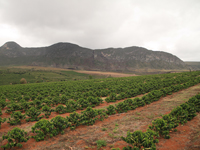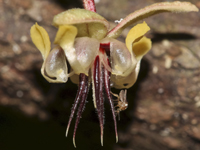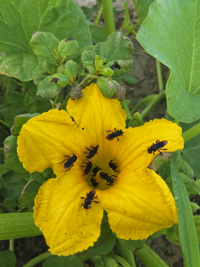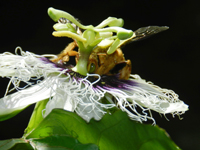Bees and Crop Plants
Freiburg, Feb 05, 2020
Stingless bees such as these here on a pumpkin blossom are often wrongly taken for pests. The Pollination Guide should help to prevent mistakes like this. Photo: Mikail Oliveira
Over many years, researchers from the University of Freiburg have compiled data on the global pollination of major crop plants, above all fruit and vegetables. Together with scientists from the Federal University of Ceará in Fortaleza, Brazil, they have analyzed the data and developed a “Pollination Guide” for Brazil. The guide is intended to give Brazilian farmers information on the importance of bees and other pollinating insects, so that they treat the habitats of wild pollinators with care. “Our guide sets out the pollination requirements for important crop plant as well as information about the flower biology or which insects visit the flowers, and which groups of insects and species are best at pollinating each crop,” explains biologist Prof. Dr. Alexandra-Maria Klein from the Chair of Nature Conservation and Landscape Ecology at the University of Freiburg.
Covering almost 150 pages and with more than 200 photos and numerous flower studies and illustrations, the guide offers information on the growing regions, fields, blossom, pollinators and fruits in Brazil for each plant crop. The researchers describe the pollination requirements – the mating system of the plants – and the pollinators that visit the flowers. Detailed flower studies show the morphology or appearance of the blossoms. As a whole, the Pollination Guide aims to pass on up-to-date ecological knowledge to farmers, horticulturalists and society in general in Brazil, in order to integrate an important ecological factor, pollination, into the production of food and improve the living conditions for pollinating insects in agricultural regions and gardens.
Prof. Dr. Breno M. Freitas from the Brazilian Federal University of Ceará is delighted about the publication, “The guide has come at just the right time, when farmers and beekeepers are becoming aware of the importance of pollinators for agricultural crops and are interested in acting, for instance either by introducing cultivated bees or taking measures to promote the development of wild bees in arable regions.” Most of the information available in Brazil about the pollination of agricultural crops previously came from international literature and was largely unusable as the plant species or pollinators they describe often do not occur in Brazil.
The biologist Dr. Felix Fornoff of the Chair of Nature Conservation and Landscape Ecology at the University of Freiburg who collaborated on the guide is also optimistic, “I’m sure that the guide has something for everyone to learn, from anecdotal observations, cryptic mechanisms and unexpected interrelationships through to inspiring photos and a mass of primary literature.” He believes that the value of nature and wild pollinating insects will increasingly be recognized, especially by those who come in contact with rural landscapes and depend on them.
Contact:
Prof. Dr. Alexandra-Maria Klein
Chair of Nature Conservation and Landscape Ecology
University of Freiburg
Tel.: +49 761 203-67770
e-mail: alexandra.klein@nature.uni-freiburg.de
Dr. Felix Fornoff
Chair of Nature Conservation and Landscape Ecology
University of Freiburg
Tel.: +49 761 203-67790
e-mail: felix.fornoff@nature.uni-freiburg.de
Press photos available for downloading





